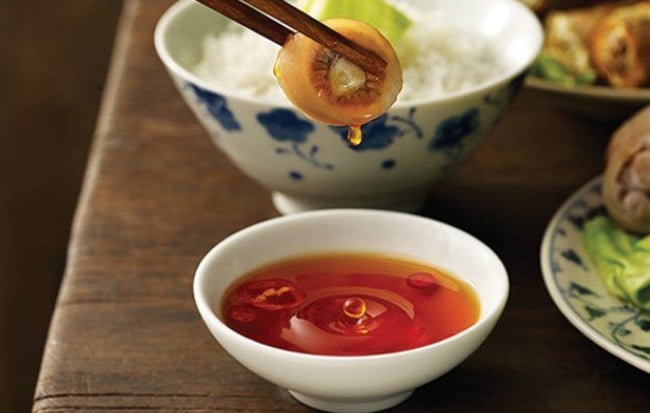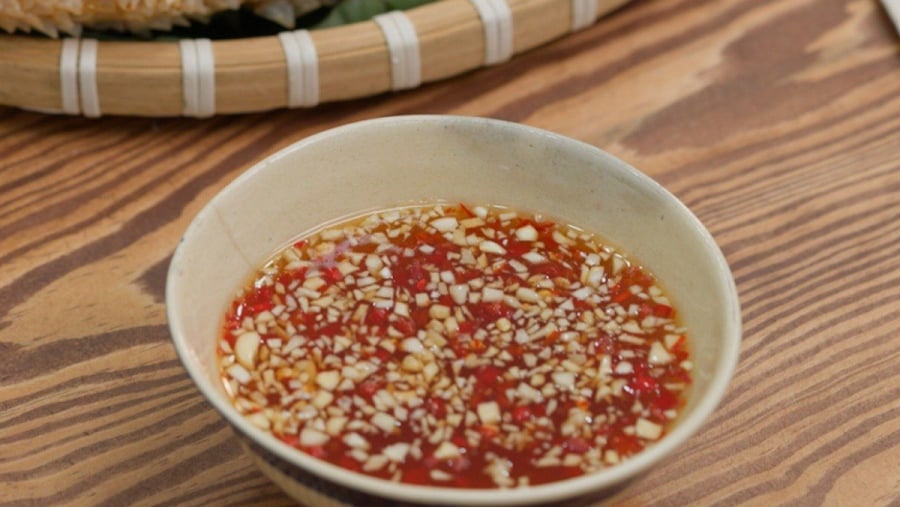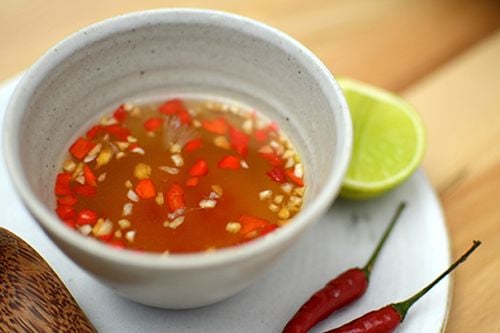Fish sauce has long been an integral part of Vietnamese cuisine, celebrated as a piece of the country’s cultural heritage. It is an essential seasoning in daily meals, not only enhancing the flavor but also instilling a sense of pride in Vietnam’s culinary culture.
According to PGS.TS.BS Nguyen Thi Lam, former Vice Director of the National Institute of Nutrition, fish sauce is more than just a condiment; it is a crucial element in preserving the community’s beautiful culinary traditions. The presence of fish sauce in a dish is what makes it appealing and diverse.
Fish sauce, made from fish, provides a natural sweetness to food due to its amino acid content. Nutritional analysis shows that 100g of fish sauce contains approximately 35Kcal, 5.1g of protein, 0.01g of lipid, 3.6g of glucid, and valuable minerals such as calcium, iron, magnesium, and manganese.
However, Dr. Lam also warns that fish sauce contains a significant amount of salt, and excessive consumption can lead to a high-sodium diet. The production of fish sauce requires 20-25% salt, which means that 10ml of fish sauce is equivalent to 2.5g of salt. Therefore, it is essential to use fish sauce in moderation to maintain a healthy lifestyle.

The production of fish sauce requires a considerable amount of salt, with 10ml containing 2.5g of salt.
**Common Mistakes When Using Fish Sauce**
Fish sauce, a staple in Vietnamese cuisine, not only adds a distinctive flavor but also packs a nutritional punch. However, if used incorrectly, it can lead to health issues. Dr. Nguyen Thi Lam points out four common mistakes consumers should be aware of:
**Dipping Excessively**
Many Vietnamese have a habit of dipping their food in large amounts of fish sauce, even flipping the food to ensure an even coating. This practice can lead to excessive salt intake, which is unhealthy. According to Dr. Lam, Vietnamese currently consume about 9.5g of salt per day, nearly double the World Health Organization’s (WHO) recommended amount. Experts advise reducing salt intake, dipping sparingly, and avoiding overly salty foods to protect your health.
To enjoy the flavor of fish sauce while maintaining a healthy diet, it is crucial to use it in moderation during cooking and consumption.

Enjoy fish sauce in moderation to maintain a healthy diet.
**Preference for Strong Flavors**
Many of us have a penchant for salty flavors, and even when food is already well-seasoned, we tend to add more fish sauce. A typical example is dipping pickled vegetables in fish sauce, indicating a persistent preference for salty tastes in our daily meals.
Dr. Nguyen Thi Lam shared an interesting observation: “When I eat pho (Vietnamese noodle soup), I notice that many people add extra fish sauce to their bowls. They believe that stronger flavors make the dish more appetizing. However, they may not realize that a bowl of well-done pho already contains 3.8 grams of salt, while a bowl of rare beef pho has about 3.34 grams.”
**Overusing Dipping Sauces**
In Vietnamese culinary culture, each dish is often accompanied by intricately prepared dipping sauces, adding a unique twist to the meal. Sauces like fish sauce, shrimp paste, fermented anchovy sauce, and ‘mam nem’ each have their distinct appeal.
However, Dr. Nguyen Thi Lam points out a notable concern: the abundance of dipping sauces on the Vietnamese table can lead to excessive salt intake. While each sauce is delicious and tantalizing to the taste buds, overconsumption means taking in more salt than our bodies need.
The habit of excessive dipping and a preference for strong flavors not only result in salt overload but also put strain on the heart and kidneys. This increases the risk of future issues with blood pressure, cardiovascular health, and kidney function. Moreover, a high-sodium diet affects calcium absorption, leading to potential osteoporosis over time. Therefore, balance in the use of dipping sauces is crucial for maintaining good health.

Balance in the use of dipping sauces is vital for good health.
**Heating Fish Sauce at High Temperatures**
Dr. Nguyen Thi Lam offers an important piece of advice for those who frequently use fish sauce in cooking: avoid heating fish sauce and other foods at high temperatures, as this can lead to degradation.
According to Dr. Lam, when subjected to high temperatures, components like protein and lipid in food can undergo changes. Fish sauce contains amino acids, and high-temperature processing can alter their structure, affecting both the flavor and nutritional value of the product. Therefore, to retain the nutrients and distinctive flavor, consumers should pay attention to the cooking method and avoid overheating fish sauce.
**Guidelines for Rational Fish Sauce Consumption**
Dr. Nguyen Thi Lam provides suggestions on how to use fish sauce rationally to ensure tasty meals without compromising health. To reduce the saltiness of fish sauce, she recommends diluting it with a bit of lemon, chili, or garlic. These ingredients not only lessen the saltiness but also enhance the flavor of the dish.
Additionally, for those who favor salty flavors, Dr. Lam emphasizes the importance of including green vegetables in their meals. Green vegetables are rich in potassium, which has a diuretic effect, aiding the body in eliminating excess salt through increased urination.
However, the best practice is to reduce daily salt intake. The World Health Organization (WHO) recommends that adults lower their salt consumption to less than 5g per day for optimal health.
“Nature’s Hidden Gem: The Sweet Veggie with a Magic Touch”
Introducing a vegetable that is sweet and savory, with leaves resembling papaya, yet remains unknown to many. This humble vegetable boasts an impressive nutritional profile, making it an ideal food for those recovering from illness. With a taste akin to MSG, this vegetable is a hidden gem in the culinary world, waiting to be discovered by discerning palates.
The Ultimate Guide to Cooking Mouth-Watering Sweet and Sour Pork Ribs
With this mouth-watering sweet and sour spare rib recipe, you’re in for a real treat. The flavors burst in your mouth, tantalizing your taste buds and leaving you wanting more. It’s a dish that’s sure to impress, with a perfect balance of sweet and sour that’s hard to resist. This recipe is a must-try for food enthusiasts looking for an explosion of flavors.





































